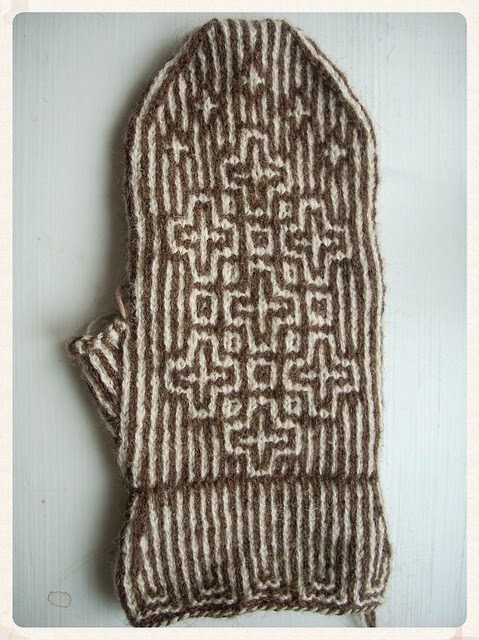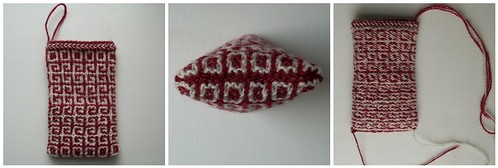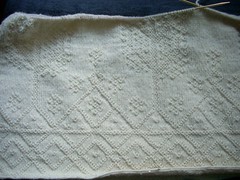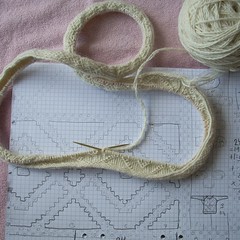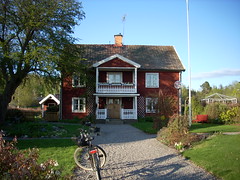Saturday, 18 June 2016
Twined news
Speaking of twined knitting, I made a twined mini purse recently to test a pattern idea. Mini as in room for a couple of USB sticks.
Monday, 13 June 2016
Twined & brioche projects
Today my friend Andrew gave me a charming tatting book from 1944 - there are many beautiful patterns in it, so I feel like getting my shuttles out again. I don't have the nails to match them, but at least I do have a new twined knitting project to match the cover.
The patterns are from A History of Hand Knitting by Richard Rutt, actually the very same cushion I got last post's pattern from, but I'm using thicker yarn and needles. Or, rather, not as thin: 500 metres/100 gr wool-silk blend and 2 mm needles.
 |
| Gauge curious? 54 stitches = 10 cm/4 in |
Yesterday I added a finishing touch to a pair of twined mittens I finished last year. They were slightly too wide, so I felted them by hand and now they fit perfectly - and the fact that I love both grey and stripes doesn't hurt.
For the mittens I used wool from Östergötlands ullspinneri. It works beautifully for brioche knitting too, and I've made two brioche scarves recently using their variegated wool. (Knitting with 4 mm needles almost felt like cheating now that I've been into 1.25 - 2 mm for a while.)
With felted twined mittens and two scarves I should be well prepared for Midsummer - it normally gets rather cold then, or perhaps that's just my impression?
Tuesday, 7 June 2016
Happy new year!
No, I'm not a giant (anyone who has met me will be able to testify) although you might think so comparing the stitches to my hand. This is my personal gauge record, 70 stitches to 10 cm/4 in, which I managed by combining twined knitting and 1½ mm needles. The pattern is from Richard Rutt's A History of Hand Knitting.
Speaking of books, here's a photo of a treasure, a stunning collection of Latvian mitten patterns available from Sena Klets. Actually, I've seen this book before, but now that I have an English copy I can read about culture and traditions too. Extremely highly recommended! (Time to go back to planning and proof-knitting, but hopefully it won't be another five months before next post...)
Thursday, 11 December 2014
Twined mittens finished
Thanks for your comments on my mittens in progress! I finished them late last night, and luckily enough there was actually almost some sun this morning - so I thought I'd share some photos of details.
Thanks to Ravelry, there's no really no need for me to add a year to remember when I made it, but it's a nice detail. Also, there are so many memories and associations are knitted into these mittens that I would be able to date them in the future: above all, teaching at HV and the people I've met there.
Here is the join, a three-needle bind-off:
 |
| the gingerbread whale |
In sweaters I like adding my initials to a gusset; in this case I chose the inside of the thumb:
The thumb decreases are placed at an angle. It may look a bit strange at first, but it makes them incredibly comfortable! This wasn't my own idea, but something I learnt from Karin Kahnlund.
Thursday, 27 November 2014
"Ever tried. Ever failed. No matter. Try again. Fail better."
Few things are as inspiring as teaching, in my opinion. To begin, planning workshops and exercises gives me lots of ideas - but even more questions from participants, not to mention seeing how they use instructions as starting points for their own ideas. During my latest twined weekend at HV I cast on to make a pair of mittens to put some pattern and shape ideas into practice.
Almost as inspiring but far more time-consuming is not being satisfied with the results... Actually, I don't mind it very much as long as I can think of ways to make improvements. It gives me material for a blog post too!
First, the shape wasn't quite right: the cuff was too long (not to wear, but to me it looks out of proportion) and more importantly, the mitten was slightly too narrow to be comfortable:
This shorter cuff looks a lot better and the width is comfortable - but the placement of the pattern is out of balance. It looks as if it has sunk and hit wrist bottom:
To look on the bright side, ripping back a number of rows (again) gave me a few meters of pre-twisted yarn to work with:
I thought of adding a horizontal line to frame the pattern shapes, but decided it would look odd, so I added five small pattern shapes instead:
The mitten doesn't really match what I had in mind, but then my finished projects seldom (never?) do. Here is where I would stop if I was less pleased with it (and use it for workshops) but I'm happy enough with it to knit a second one.
Thursday, 22 September 2011
Twined knitting with two colours
The other day I saw super knitter Tålamodspåsen's phone case and thought I'd make one for myself to test a couple of pattern ideas for twined knitting.
For easy comparison I like having different versions of the same idea in a swatch, in this case a pattern with knit stitches and then with both knit and purl stitches. Not only do they look and feel slightly different, the one with purls is thicker too.
Twined knitting with two colours looks a bit like mosaic knitting, but there are major differences. In mosaic knitting you knit with one colour at a time and slip stitches to make a pattern; in twined knitting you knit with both colours and cover stitches with the strand you don't knit with to make a pattern. I haven't knitted much mosaic knitting, but it seems to me it tends to curve (depending on the pattern) in a way twined knitting doesn't. Not that it's a bad thing necessarily - I can see how it could be an effect you'd want to achieve.
 |
| All the twisting makes it necessary to unwind the two strands every now and then. Having just one ball of yarn makes it easier: you just let it hang in the air. |
Edited to add: how I wish I could draw like Mattias!
Sunday, 15 May 2011
Sleeve patterns
After knitting my new idea (actually a shape I tried and liked in my first twined sweater, visible in the background) and comparing the two sleeves I've decided to go for the version to the right.
Saturday, 7 May 2011
Trees nearly done
A tree would be too big, so it will probably some combination of geometric shapes.
Wednesday, 27 April 2011
Twined sweater progress
Asplund the Narcissist is trying to knit aspen trees using the twined technique; six trees around the sweater will make an aspen grove, an "asplund" in Swedish. (For a while I thought the trees looked more like broccoli, but now I'm confident about them again!)
Kerry asked about the technique. You knit with two strands that you twist between each stitch. It's time-consuming but well worth it for the deep-relief effect when you combine knit and purl stitches; keeping the strand you don't knit with in front makes a difference too.
In this post there's a photo of the right and wrong sides and a link to a great blog about the technique.
To answer some questions in comments on the "Reunion" post:
Christine: I love the lingonberry pattern too and found it in a book by Inger and Ingrid Gottfridsson. There is an English translation of it, "The Mitten Book". Hope you find it! I agree with you about being critical right after one has finished a project. It's so easy to (or impossible not to) compare the garment to what one had in mind.
Ann: alas, no new labels. Actually, there's evidence I'm still Mormor because a group of pupils once gave me a mug with that word on it!
About the green ribbing (Martin's green and white sweater): I used thinner needles and made it fairly wide (3k, 2 p in this sweater. If it's still flabby (which happens) I'd knit it twice as long as I want it and fold it in half.
Sunday, 1 November 2009
Cecilia's twined mittens finished
At long last I've finished the twined mittens I cast on for Cecilia in April. There was no hurry then, and when I picked them up again after summer I had some difficulties with the pattern, since I decided to abandon my original idea.
I really wanted the thin lines to frame the hand and merge with the broad line in the middle, but then diagonal (and horizontal) lines pop up while vertical lines sink. I don't mind three levels if it's an allover pattern, on the contrary, but I think it would look silly with just two lines suddenly rising where the mitten ends. Cecilia appreciates simplicity, so I simply skipped the frame idea. Let's just hope her hands won't look like dark grey, cloven hooves.
For examples of Cecilia's immense artistic talents, check out her blog A Matter of Form. Another idea is to visit gallery Sigtuna Kulturgård, where she and her husband Mattias will be displaying their work during three weekends starting on Sat. 7 November.

Sunset in Uppsala.
Saturday, 24 October 2009
Twined sweater: reknitted rows
It was a good decision to rip out and reknit part of this project. It has taken almost a week to catch up, but I like the way it looks a lot better now.
I'm not sure how to continue, though. There's no lack of ideas, it's rather a matter of choosing the right one; even if I don't mind ripping out and reknitting I'd rather not if it can be avoided...
The best thing is probably to let it rest for a while and work with some other projects. There's no lack of works in progress either.
Or lack of yarn, for that matter: I just went through my stash (well, part of it) and discovered a couple of skeins identical to some yarn I found too beautiful to resist the other day, especially since I was sure I had never seen those shades before. It seems I'm even better at fooling myself than I thought, which is a bit worrying. Or promising!
Sunday, 18 October 2009
WIP: Twined sweater
What I didn't quite like was the main pattern I had come up with. Some details looked far better on paper and in my imagination than they did in reality, so I ripped out 15 rows – more than 6,000 stitches... It's annoying, but not nearly as annoying as seeing things in a finished sweater that I was too lazy to change.
I'm happy with how it looks in this photo, which I took after picking up the stitches again.
Thursday, 8 October 2009
Twined knitting: right and wrong sides
The wrong side almost looks crocheted rather than knitted.
Here's a blog with great photos that show the basics of the technique.
Tuesday, 6 October 2009
Anniversary
Almost exactly a year has passed since I cast off my first twined sweater. What better way to celebrate than to cast on a new one?
This sweater will be similar but not identical; I want to test some new construction and pattern ideas.
Kampes z-plied wool ordered from Firma Krokmaskan.
Tuesday, 29 September 2009
Twined & stranded mittens finished
Saturday, 26 September 2009
Combining twined and stranded knitting
A few months ago I promised my friend Lotta a pair of mittens. Now that the days keep getting shorter and cooler it's high time to get started!
I decided to try combining two knitting techniques, twined and stranded. The cuff is twined, which makes it stiff and dense, not very elastic - and I've discovered it's a technique that is great for knitting letters.
The main part is stranded, partly for elasticity, partly for warmth. I find twined knitting is more wind-proof, but stranded somehow warmer thanks to the floats. Or, rather, they're suitable for different kinds of weather.
The palm 
Twined stripes: ca 3.5/cm or 9/inch; stranded stripes: ca 3/cm or 7.5/inch. (In addition, the stranded stripes are elastic.) The gauge difference is rather remarkable; same yarn, same needles, same pattern and same number of stitches, but different techniques.
Thursday, 7 May 2009
Sometimes I'm efficient
Last night I met up with two groups of knitters, first at a café in Finspång and then in this beautiful house in Ljusfallshammar.
What's more, they were all into twined knitting (Sw. "tvåändsstickning") so it was an unusual and unusually pleasant evening.

I even managed to buy some yarn: seven hanks of wool-silk blend, enough for at least two shawls.
Not that I need shawls, but I do need to make them (Dr Asplund's orders) and I think "Lady's circular cape in shell pattern" would be lovely in this pale pink hue. Where the pattern is? Victorian Lace Today, of course.















